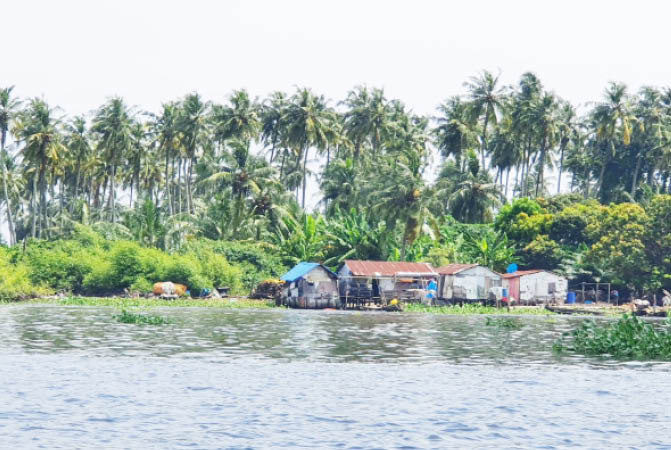Nigeria joined the rest of the world to mark the 2024 World Mangrove Day on July 26 to raise awareness on the importance of mangrove ecosystems and promote solutions for their sustainable management, conservation and utilisation.
Mangrove forests once fringed most of the world’s protected tropical coastline but have historically suffered significant losses due to coastal aquaculture, agriculture and urban development.
In Nigeria, mangrove forest covers an area of 10,500km2, making it the largest in Africa and the third largest worldwide.
According to experts, Mangrove is important as a source of construction, energy and industrial raw materials, as well as ecosystem services. Despite these benefits, however, there has been large-scale degradation of the mangrove forests across the globe.
- NABTEB launches digital platform to ease verification, certificate collection
- Tinubu inaugurates southern monarchs’ council
While mangrove equally helps in coastline defence and protection against sea-level rise, storm surges, strong winds, wave attenuation, drainage and erosion, many communities around the mangrove areas have over the years engaged in degrading the forest in search of energy and livelihood.
Experts, however, submit that with mangrove decrease also came the loss of the many beneficial goods and services offered by the fascinating ecosystems, including the capacity to store carbon to mitigate global climate change, protecting coastal communities from storms, and the provision of nursery habitats to many commercially important fish and crustacean species.
The recent first Red List assessment of global mangrove ecosystems by the International Union for Conservation of Nature (IUCN) has found that 50 per cent of the world’s mangrove ecosystems are at risk of collapse and in the absence of additional conservation efforts, by 2050, about 7,065km2 more mangrove would be lost and 23,672km2 will be submerged.
According to IUCN, if that is allowed to happen, the world is at risk of losing 1.8 billion tons of carbon (16% of the total current carbon stored in mangroves) currently valued at least $13 billion at market prices in voluntary carbon markets and representing a cost to society equal to $336 billion based on the social cost of carbon.
Also, protection for 2.1 million lives exposed to coastal flooding and $36 billion worth in protection value to properties as well as the loss of 17 million days of fishing effort per year would be lost if effective protective measures are not urgently implemented.
While noting that loss of mature forests is still rampant in some regions, such as West Africa and Southeast Asia, IUCN said the major threats to mangrove ecosystems include degradation caused by pollution, invasive species, and loss of hydrologic connectivity.
“Predicted future sea-level rise exacerbated by “coastal squeeze” could submerge and drown up to 25% of the existing mangrove forests in the next 50 years,” the report read.
Analysis of mangroves in Nigeria
An Analysis of Mangrove Forest Resources in Nigeria for State Specific Restoration Policy by A. O. Olaniyi of Department of Environmental Management, Faculty of Environmental Sciences, Kaduna State University, noted that mangrove conversion, degradation and destruction need to be holistically addressed in order to avert its associated climatic change.
According to the results of the study, Bayelsa State had the largest mangrove cover (41%) in Nigeria and also accounts for 49 per cent of the total mangrove loss at the rate of – 2.61% over 1996-2016. However, Ondo state with a relatively smaller size (0.3 %) of mangroves has the highest (-42.31%) rate of loss in mangroves followed by Lagos (-6.11%) and Akwa Ibom had the least (-0.42%) rate of conversion of the mangrove.
Olaniyi said the knowledge of the rate of loss in mangroves is important for identifying the hotspots of the loss, for investigating the drivers, estimating the extent of blue carbon stock depletion and in advocating aggressive conservation and or restoration efforts at the subnational levels.
He said: “The Federal Government of Nigeria, considering the adverse effects of mangrove degradation on climate change, livelihood and humanity survival, enacted the mangrove forest reserves, national parks/protected areas in 1992. However, there is no evidence to believe that the initiative has been efficient in addressing mangrove degradation.
“In a follow-up programme, and given the importance of mangrove restoration in carbon credit, the Federal Government of Nigeria in the year 2020 also launched the “Mangrove For Live Project” aimed at improving coastal sustainability, restoring the degraded mangrove and establishing Marine Protected Areas (MPAs) by increasing mangrove cover by at least 25 per cent to be implemented using community-based approach (CBA) owing to the fact that Nigeria currently does not have national action plans and marine protected areas to adequately ensure sufficient conservation and protection of the mangroves,” he added.
Olaniyi recommended educational awareness campaigns, capacity building, use of energy efficient/alternative sources of energy, application of indigenous knowledge, enforcement of community by-laws and sensitisation, mobilisation and engagement for climate action, implementation of poverty reduction programmes as sub-national measures to strengthen the mangrove protection and conservation at individual states levels within Nigeria to achieve the intended sub-national mangrove extent and status.
Why mangroves are important
According to reports by international organisations, mangroves are important and the society must be educated to know how important it is to stop cutting trees.
The experts said mangrove reduces atmospheric carbon dioxide and can be key to preventing climate change, and reducing pollution.
An environmentalist, Almami Dampha told Daily Trust that the importance of mangroves is limitless and necessary for mankind’s existence, which includes provision of oxygen, food and clothes among others which cannot continue without the existence of trees.
He said the conservation of mangrove trees is even more crucial because they harbour a plethora of fauna and can be a key to reducing global warming and addressing issues of pollution and climate change among others.
“They are a source of income and food as mangrove offers a comfortable habitat to organisms and can provide small-scale income to the neighbouring communities without damaging the mangrove habitat. People can find fishes, crabs and shrimps in such areas and when harvested they can sell and eat as well to help them have s sustainable life,” he said.
While urging African governments to stop converting mangrove ecosystems to human settlements and other unsustainable uses, he called for the strengthening of laws governing the management of mangroves at all levels.
Meanwhile, to commemorate the 2024 International Day for the Conservation of the Mangrove Ecosystem, the Minister of Environment, Balarabe Abbas Lawal, while planting mangroves, disclosed that they are vital for coastal protection, biodiversity, and carbon sequestration.
The minister participated in planting mangroves in Bomu Waterfront, Ogoniland, Rivers State.
He disclosed that mangrove ecosystems act as natural barriers against storms and erosion, sequester carbon at rates three to four times higher than terrestrial forests, and serve as nurseries for countless marine species.
He also stated that mangroves are more than just trees; they are guardians of our coastlines, protectors against climate change, and providers of livelihoods for millions.
He revealed that the commemoration of the 2024 International Day not only enhances climate resilience but also supports local communities by providing natural protection against climate change, and resources such as medicine and food.
“So far, we have planted 514,819 mangrove seedlings. While restoring mangroves through assisted planting, reducing mangrove harvesting pressure is also necessary. Thus, we commemorate this year’s World Mangrove Day with two significant activities. We are launching Growcoon as a sustainable alternative to using single-use plastics to nurse mangrove seedlings,” he said.
Balarabe appealed to the community to ensure that the mangrove seedling are protected and urged them to plant mangrove trees for the benefit of the community, Niger Delta people and the country in general.
Earlier, the Minister of the Niger Delta Ministry, Engr. Abubakar Momoh, also advised the people of the Niger Delta to plant more trees to safeguard the environment and ecosystem.

 Join Daily Trust WhatsApp Community For Quick Access To News and Happenings Around You.
Join Daily Trust WhatsApp Community For Quick Access To News and Happenings Around You.


